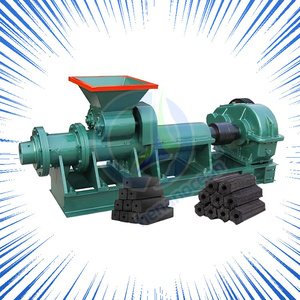(486 products available)

























































































































































































































A complete briquette machine creates fuel briquettes from various biomasses through a high-pressure screw extruder mechanism. Briquette machines come in two primary types: screw and piston/oil hydraulic presses. The details are as follows:
Complete briquette machines are used in various industries for different applications. The following are some of the industries and scenarios where complete briquette machines are commonly used.
Biomass energy industry
Complete briquette machines are primarily used to convert biomass waste into biomass fuel briquettes. The briquettes serve as clean and renewable energy sources for use in energy generation, heating systems, and cooking.
Food processing industry
Complete briquette machines can be used to produce animal feed pellets. Such machine-made pellets are easier for animals to digest, and they can feed different livestock, such as poultry, cattle, and pigs.
Agriculture
In agriculture, complete briquette machines can be used to process agricultural by-products and reduce waste. Straw, husks, and other leftovers can be transformed into briquettes for mulching, soil improvement, or as fuel for agricultural machinery.
Carbonization plants
Carbonization plants use complete briquette machines to produce charcoal briquettes from organic materials. The briquettes are used for BBQ, food industry cooking, and forging metallurgy as well as industrial fuel.
Construction industry
Complete briquette machines are used to process construction waste, such as wood scraps, pallets, and packing boxes, into fuel briquettes. The construction fuel briquettes can be recycled and used to reduce waste and lower environmental impact.
Metal recycling industry
Complete briquette machines are extensively used in the metal recycling industry. They are perfect for compressing metal scraps like chips, turnings, and shavings into compact briquettes for easy recycling and reducing storage space.
Marine industry
Marine industries use complete briquette machines to process organic waste on board vessels. Such organic waste includes food scraps and agricultural waste. The machine converts the waste into briquettes, which reduces storage space and odor and minimizes environmental pollution.
How to choose complete briquette machines
Business buyers should consider the following factors when purchasing a complete briquette machine for their business:
Understand raw material requirement:
Complete briquette machines are designed to work with specific raw materials. Buyers should ensure the machine they intend to purchase can work with the type of material they wish to process. In some cases, buyers will have to explore the option of investing in a complete material-preparation system.
Production capacity:
Business buyers need to consider the amount of briquettes they need to produce each day. They should consider the machine's production capacity. Go for machines that offer flexibility in production so buyers can easily adjust their output according to changes in demand.
Quality of briquettes:
The complete briquette machine has quality control features like airlocks, weighing systems, and cooling systems. Buyers should look for these features, as they will help monitor the briquettes' quality. Also, consider buying machines that produce high-quality briquettes with strong adhesive bonds.
Briquette shapes and sizes:
With diverse end consumers, buyers need to choose briquette machines that offer shapes and sizes. To do so, buyers should research their market and determine what shapes and sizes their customers demand. Consider machines with adjustable molds and die that will allow buyers to customize briquettes according to customers' preferences.
Power requirements:
Complete briquette machines will have different power requirements according to their size and capacity. It is essential to consider the briquette machine's power requirements when selecting a machine. Buyers should ensure they have sufficient electricity and infrastructure to operate the machine.
Final product's intended application:
Whether a buyer is manufacturing fuel briquettes, paper recycling briquette maks, or animal feed briquettes, they need to ensure the machine they choose has the features and specifications that will enable them to meet their end product requirement.
Q1: What raw materials can a complete briquette machine use?
A1: It depends on the type of machine. Generally, there will be adjustments and settings that permit diverse raw materials to be used. Standard ones include agricultural residue, wood, forestry residue, energy plants, rubber and plastic products, household waste, and municipal solid waste.
Q2: How does a complete briquette machine improve fuel?
A2: A complete briquette machine compresses biomass materials into a dense fuel known as biomass briquettes. These have a higher calorific value than loose biomass and produce more energy when burned, improving fuel utilization.
Q3: Can a complete briquette machine increase income?
A3: People and businesses can sell the briquettes as eco-friendly fuel in local and international markets. The commercial viability of a complete briquette machine can vary depending on market demand, competition, and production costs.
Q4: Can a complete briquette machine affect storage and transportation?
A4: Yes. Biomass briquettes take up less space than loose biomass material. Additionally, they are more robust than loose biomass and hence easier to transport. Storage is also simplified as they can be stored in bags or containers.
Q5: Can a complete briquette machine affect carbon footprints?
A5: Reducing reliance on fossil fuels can lessen greenhouse gas emissions. Using a complete briquette machine and shifting to biomass briquettes helps reduce dependence on fossil fuels and lowers carbon emissions.